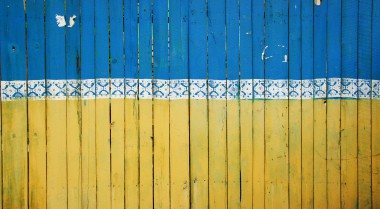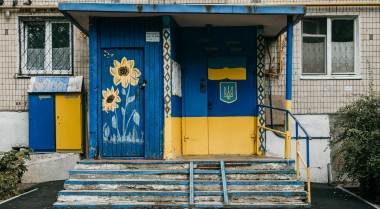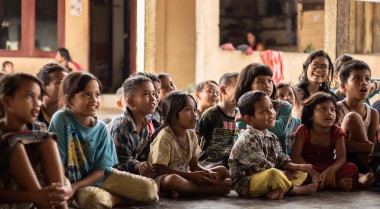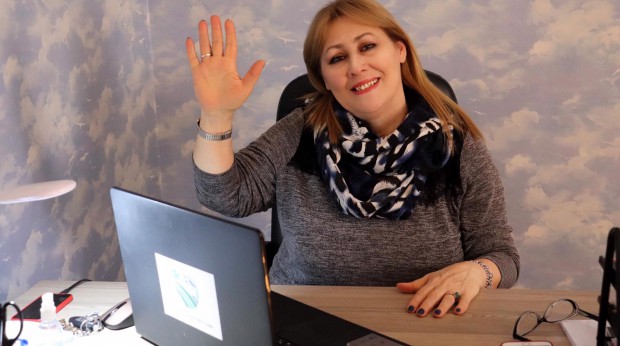
A Ukrainian plea for supporting local peacebuilding
On 26 April 2022, I felt heard. I, as a Ukrainian woman peacebuilder, spoke to the leaders of the world about feminist financing for peacebuilding. And they listened with open ears and open hearts. But this attention has not always been given to us. Since Russia annexed Crimea and invaded the East of Ukraine eight years ago, international attention to peacebuilding work in the region has been inconsistent regardless of the rapid development of authoritarianism in Russia and Belarus and the pressure of hybrid war in Ukraine. This has been particularly challenging for women peacebuilders in Ukraine who receive limited attention and insufficient funding from the international donor community. But I do not want to point fingers. Rather, I am inviting you to learn hard lessons from disregarding Ukraine’s peacebuilding needs for so long.
This is my plea as a proud Ukrainian to invest in long-term prevention and peacebuilding, especially for women. During wartime, as women are caught between the frontlines and fiercely fighting on them, financing for peacebuilding is more urgent than ever. Let me tell you why.
Even though Russian missiles fire on our cities every day and people flee, opportunities to build peace still exist
In my view, the general public understands peacebuilding as something that happens after fighting has stopped. However, experience shows peacebuilding should take place before, during, and after war.
Now, you might ask yourself: how can we focus on peacebuilding when millions of people are internally displaced or fleeing the country, the majority of them being women and children, when thousands are injured, and when there is nothing to eat? Don’t they first and foremost need humanitarian assistance in the form of shelter, medicine, mental health support, and food? Yes, they do of course. However, shifting available peacebuilding donor funding for Ukraine to humanitarian aid is like putting a bandage on a finger when you have a broken arm. Humanitarian aid alone is not enough to leave a solid foundation for society to recover from the shock of violence of a full-scale foreign invasion.
Instead, we should seek opportunities to combine our efforts, whether development, peacebuilding, or humanitarian assistance. We, peacebuilders, for instance, have the indispensable local knowledge and tools to foster a culture of peace by providing peace education or setting up platforms for dialogue even in war-torn contexts. Our work is essential as we keep on building bridges between people to minimize the societal impact of conflict that can make people choose violence over dialogue and hateful and hurtful remarks over words of support and encouragement. But to make all these efforts possible, we need sustained and flexible funding - a difficult ask during the war when many donors keep telling us it is not the right time for peacebuilding. But how do they know? Do they really understand our reality, dare I ask? This sudden reprioritization of major donors has serious consequences for our work as their priorities and decisions affect how much money we have available to conduct our work.
Networks provide crucial flexible financial support and much more
The GPPAC network has been particularly useful for us peacebuilders in Ukraine to mitigate the challenging consequences of redirected funding. GPPAC is not simply an intermediary organisation. It is much more than that. As a network bringing together over 240 local organisations, it is a space of solidarity and a safe platform to learn from and with each other, and a true champion in funding locally-led peacebuilding.
GPPAC is a pioneer in shifting the power dynamics to local peacebuilders so that they can be in the lead in designing and implementing projects, encouraging them to adjust activities if necessary or opportunities arise. GPPAC supports its members through small grants especially for youth-led and women-led organisations as well as through emergency funds. They are unique because they are based on a participatory grantmaking approach that highlights local ownership. Most importantly these funding schemes put local peacebuilders, especially those who struggle extra hard to get funding such as women and youth, in the lead. GPPAC small grants are a great start but the amounts are short-lived. What we need is funding for long-term peacebuilding. Building on the best practice by GPPAC, all major donors should not only trust local peacebuilders’ expertise and allow them to continuously adapt their activities in response to the situation on the ground, but they should also provide long-term funding opportunities. As we have seen in Ukraine, things can change overnight and local peacebuilders know best what is needed on the ground.
A true peacebuilding opportunity: Establishing a platform for women-led dialogue
How can we now put local peacebuilding and flexible, feminist funding for women and youth concretely into action in Ukraine? With the support of GPPAC members and friends from the Women’s Mediation Network in the South Caucasus and members in Central Asia, we are in the process of establishing a women’s regional platform for dialogue. The goal is to create a safe space for dialogue in Eastern Europe for women peacebuilders as they are the ones building the foundations for peace. By financially supporting a dialogue platform for women organised by women during wartime, an essential line for the reconstruction of society after the violence of full-scale war is kept alive.
I hope you now recognize that financing of peacebuilding is needed across the conflict cycle, early enough so that people do not have to witness the cruelties of war and instead enjoy a life free of fear and indignity.
This piece is based on my statement given during High-Level Meeting on Feminist Financing on 26 April. Read the full statement here.



